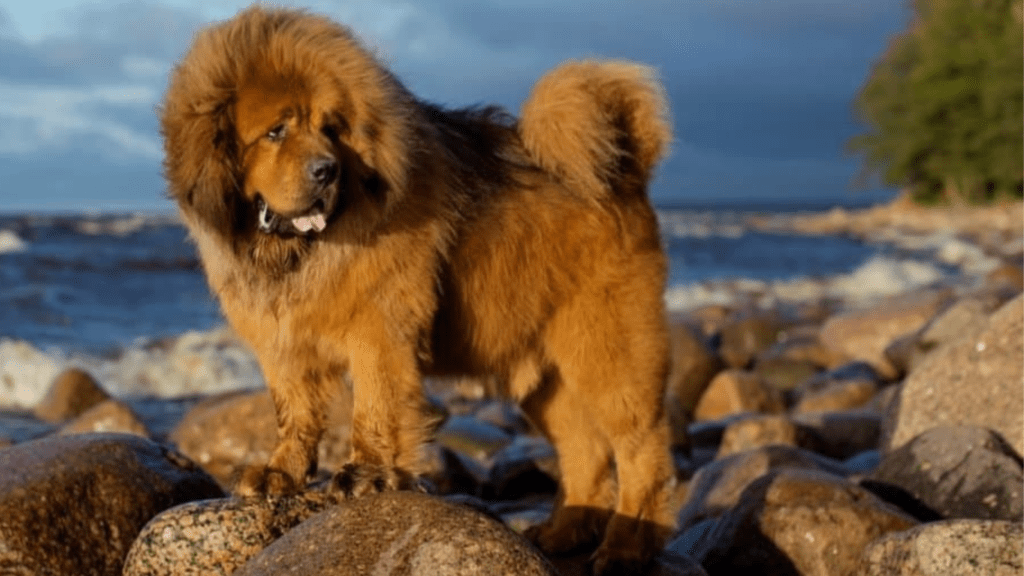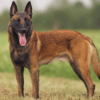The Mastiff is a large and powerful breed of dog known for its size, strength, and gentle nature.Here’s information about Mastiff Dog:
Appearance:
Mastiff Dog are massive with a strong and muscular build. They have a large head with a short muzzle and drooping jowls. Their eyes are expressive and often dark in color. The ears are medium-sized and hang down close to the head. They have a short, dense coat that can come in various colors, including fawn, brindle, and apricot.
Size:
Mastiffs are one of the largest dog breeds. Males typically stand about 30 inches (76 cm) tall at the shoulder and can weigh between 160-230 pounds (73-104 kg). Females are slightly smaller, measuring around 27.5 inches (70 cm) in height and weighing between 120-170 pounds (54-77 kg).
Temperament:
Despite their imposing size, Mastiffs are generally known for being gentle, calm, and affectionate dogs. They are loyal and protective of their family, making them excellent guard dogs. Mastiffs are generally good with children and can be quite patient and tolerant. However, proper socialization and training from an early age are crucial to ensure they grow up to be well-mannered adults.
Exercise and Training:
Mastiffs have a moderate activity level and are not overly energetic. They require daily walks or exercise to keep them physically and mentally stimulated. However, excessive exercise should be avoided, especially in puppies, as their joints are still developing. Training should be consistent, firm, and positive, utilizing rewards and praise.
Health:
Like many large dog breeds, Mastiffs can be prone to certain health issues. Some common concerns include hip dysplasia, elbow dysplasia, bloat (gastric torsion), heart problems, and certain forms of cancer. Regular veterinary check-ups, a balanced diet, and maintaining a healthy weight are important for their well-being.
Lifespan:
The average lifespan of a Mastiff is typically around 6 to 10 years. However, with proper care, some Mastiffs have been known to live even longer.
Medical Issue:
Hip Dysplasia:
This is a genetic condition where the hip joint doesn’t develop properly, leading to joint instability and eventual arthritis. It can cause lameness and discomfort. Regular screening and breeding of dogs with good hip scores can help reduce the incidence of hip dysplasia.
Elbow Dysplasia:
Elbow dysplasia is a condition that affects the elbow joint and can cause lameness and arthritis. Similar to hip dysplasia, responsible breeding practices can help minimize the occurrence of this condition.
Gastric Dilatation Volvulus (Bloat):
Bloat is a life-threatening condition that can affect deep-chested breeds like Mastiffs. This can lead to a rapid onset of symptoms, including a distended abdomen, restlessness, unproductive retching, and difficulty breathing.
Cardiac Issues:
Some Mastiffs may be prone to certain heart conditions, such as dilated cardiomyopathy (DCM) and subaortic stenosis (SAS). Regular cardiac evaluations by a veterinarian can help detect any potential heart problems early on.
Joint and Bone Issues:
Due to their large size and weight, Mastiffs can be more susceptible to joint and bone problems, including osteoarthritis, osteochondritis dissecans (OCD), and panosteitis (growing pains). Providing a balanced diet, appropriate exercise, and maintaining a healthy weight can help minimize the risk of these issues.
Cancer:
Unfortunately, Mastiffs, like many other dog breeds, can be prone to various forms of cancer. Regular veterinary check-ups and early detection are important in improving treatment options and outcomes.There are some signs that a dog might display if they are experiencing pain or potentially have cancer.
Conclusion:
In conclusion, Mastiffs are magnificent dogs known for their size, strength, and gentle nature. They make great family pets and are known for their loyalty and protective instincts. While they require proper care, training, and socialization, Mastiffs can be wonderful companions for the right owner. It’s important to be aware of potential health issues associated with the breed and to provide them with the necessary veterinary care and attention. With responsible ownership and a loving home, Mastiffs can thrive and bring joy to their families for many years.
FAQ’s:
Are Mastiffs Good Family Dogs?
Yes, Mastiffs are generally good family dogs. They are known for their gentle and affectionate nature, and they often form strong bonds with their family members. However, it’s important to provide proper socialization and training from a young age to ensure they grow up to be well-behaved and well-adjusted around children and other pets.
How Much Exercise Do Mastiff Dog Need?
Mastiffs have a moderate activity level and don’t require excessive exercise. Daily walks and some playtime in a secure area are usually sufficient to meet their exercise needs. However, it’s important to avoid strenuous exercise, especially in puppies, as it can put stress on their developing joints.
Are Mastiffs Easy To Train?
Mastiffs are generally intelligent and eager to please, which can make them trainable. However, they can also be somewhat independent and may have a stubborn streak at times. Consistency, positive reinforcement, and patience are key when training a Mastiff. Starting training early and providing socialization with different people, animals, and environments is important for their development.
Do Mastiffs Drool A Lot?
Yes, Mastiffs are known for their tendency to drool. The loose skin around their jowls and the shape of their mouth can contribute to drooling. If you are considering a Mastiff, be prepared for some slobber and keep a towel handy to wipe their mouth.
How Long Do Mastiffs Live?
The average lifespan of a Mastiff dog is typically around 6 to 10 years. However, some Mastiffs have been known to live longer with proper care, nutrition, and a healthy lifestyle.



